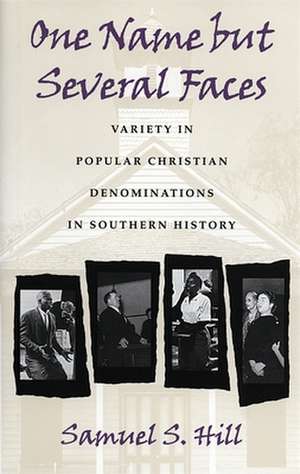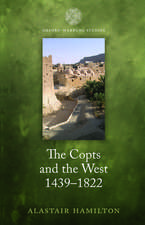One Name But Several Faces: Variety in Popular Christian Denominations in Southern History: Jack N. and Addie D. Averitt Lecture Series, cartea 5
Autor Samuel S. Hillen Limba Engleză Hardback – 30 apr 1996
In this richly suggestive overview, a noted historian illuminates the variety and vitality of southern religion by examining three major Protestant denominational families in the region: Baptists, "Christians" (for example, the Churches of Christ), and the "of God" groups (Pentecostals, among others). Ranging in coverage from the colonial period to the present, with special emphasis on the nineteenth century, Samuel S. Hill traces the growth and diversification of each of these groups as they have sloughed off old patterns, conventions, and constraints in their never-ending searches for systems of belief and modes of expression that better embody their convictions and fit their socioeconomic situations.
Throughout "One Name but Several Faces," Hill turns again and again to the interrelated themes of freedom, creativity, and discontinuity that emerge from the major transitions of southern religious history: the toppling of the old Europe-influenced religious establishment and the emergence of Baptists and Methodists; the informal, unofficial "establishment" of folk religious formations; the rapid growth of separate and independent black churches and denominations; and the beginning of the Holiness and Pentecostal movements. Within this context of religious trends and events, Hill also points to other factors that have affected both the formation and the ongoing capacity for transformation of southern religious groups. Such factors include war, sectionalism, urbanization, industrialization, and new currents of thought.
Internal forces are also constantly at work in the religious South, says Hill. He points to a medley of sacred and secular concerns, manifested as "freedoms," that have driven religious history from the bottom up and fueled the seemingly constant splinterings and regroupings of some denominations. Some of these ideals stem from democratic principles and the theological heritage of the Reformation; others are in response to major economic and social changes. Among them are the freedoms from church and theological systems; from constraining conventions of polite society; from domination by higher social classes or by traditions perceived as inviolate; and from restraints on holistic human expression, in spirit, body, and emotions.
The story of southern religion, says Hill, is one of courage, imagination, and persistence. Not only does "One Name but Several Faces" bring into sharper focus some of the political, social, and economic contours of the religious South, it also affirms the value of some challenging new trends in historiography that allow for southern religious complexity and division without deadening or downplaying its dynamism.
Preț: 666.98 lei
Preț vechi: 913.67 lei
-27% Nou
127.62€ • 133.61$ • 105.60£
Carte disponibilă
Livrare economică 15-29 martie
Specificații
ISBN-10: 0820317926
Pagini: 144
Dimensiuni: 146 x 224 x 17 mm
Greutate: 0.38 kg
Ediția:New.
Editura: University of Georgia Press
Seriile Georgia Southern University Jack N. And Addie D. Averitt Lecture Series, Jack N. and Addie D. Averitt Lecture Series














